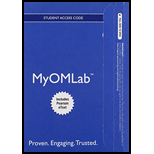
Concept explainers
Food Goblin Supermarkets use both cashiers and baggers to serve customers at check out. During the first 6 hours of each workday (Monday-Friday), 4 cashiers and 2 baggers serve approximately 20 customers per hour. A cashier and a bagger who require approximately 5 minutes at checkout and 5 minutes at bagging serve each customer.
- Calculate the utilization of both cashiers and baggers.
- Assume that both baggers and cashiers are cross trained to perform both activities so that they can serve customers independently. Customers are now both checked and their groceries bagged by one individual. Further, assume that it takes 12 minutes for one individual to both cash out and bag each customer’s groceries. Calculate the utilization of this new group of 6 cross-trained employees.
Want to see the full answer?
Check out a sample textbook solution
Chapter 4 Solutions
MyLab Operations Management with Pearson eText -- Access Card -- for Operations Management: Processes and Supply Chains
Additional Business Textbook Solutions
Horngren's Accounting (12th Edition)
Principles of Operations Management: Sustainability and Supply Chain Management (10th Edition)
Fundamentals of Management (10th Edition)
Financial Accounting, Student Value Edition (5th Edition)
Marketing: An Introduction (13th Edition)
Accounting For Governmental & Nonprofit Entities
- PP.63 Jupiter, a large candy company, is having great success with its "Swan" family of candy bars. Due to a number of factors they like to plan their production at least six months into the future. The table below contains their demand projections (in tons) for April through September: Supply/Demand Info Beginning Apr May Jun Jul Aug Sep Predicted Sales 45,500 45,100 51,900 52,800 47,900 47,200 Regular production Overtime production Subcontract production Ending inventory 14,400 Hired employees Fired employees Total employees 423 Cost variables are as follows: Cost Variables Labor cost/hour $13 Overtime cost/ton $30 Subcontracting cost/ton $28 Holding cost/ton/month $14 Hiring cost/employee $3,700 Firing cost/employee $5,800 Here is some additional…arrow_forwardWhat are the responsibilities and duties of a consultant for a local company who is considering expanding its operations to international markets? How can a local Agriculture and Food Processing company successfully enter international markets?arrow_forwardWhat is an example of how someone would explain how their past personal and professional experience makes you a quality candidate for a teaching position at an Elementary School as a K-6 Teacher?arrow_forward
- I need answer typing clear urjent no chatgpt used pls i will give 5 Upvotes.arrow_forwardHow can a local tourism and hospitality company successfully enter international markets?arrow_forwardHow was Circuit City Company collapsed? And what was the sequence of time and events or problems? How to solve the issues, and could you help identify positions or titles. Sanitize all names and use only fictitious data. What is synthesize the qualitative research methodology of Case Study research? Please give some examples. How to use the practical of Lean Six Sigma to develop a business-facing DMAIC-based case studyarrow_forward
- BUSINESS MODEL CANVAS: U.S ARMY key partners: Key activities: Key Resources: Value Propositions: Buy-in & Support: Deployment: Benficiaries: Mission budget/cost: Mission Achievement/ Impact factors: Please at least 4 for each categoryarrow_forwardhow you would best conduct a performance evaluation meeting with a subordinate (where an employee would receive their performance evaluation from their supervisor). Importantly, detail how a supervisor can best gain the concurrence from an employee on the evaluation itself, and to ensure that the employee’s performance will be modified as a result of appraisal meeting.arrow_forwardI need answer typing clear urjent no chatgpt used pls i will give 5 Upvotes.arrow_forward
- assume that you are police commander which leads and supervises the department’s internal affairs division. Your goal is to reduce civilian complainants against personnel in the department. Using what you have learned and at least three scholarly sources, document two changes you see the department can implement, whether it be training, planning, mitigating, and resolving, to improve police/community relations.arrow_forwardNess Engineering is a private limited company mainly engaged in the continuous production and assembly of domestic products. The annual turnover is $900,000,000. The largest area of expenditure is raw materials and components where the annual spend is approximately $450,000,000. The Managing Director, Bill, considers that profit margins are too small and has asked you to suggest how profitability might be increased. Bill suggests that this might be done by appointing additional sales staff and by an advertising campaign, which would, hopefully, increase turnover and thereby reduce overhead cost per item. You find that purchasing is little more than a post-office function. Specifications are received from the design or user departments and sent either to supplies designated by the directors or to the supplier providing the cheapest quotation. The company does, in fact, deal with many suppliers and issues many orders for low-cost items. All purchasing is done by manual means. None of the…arrow_forwardThe oasis outpost of Abu Ilan, in the heart of the Negev desert, has a population of 20 Bedouin tribesmen and 20 Farima tribesmen. El Kamin, a nearby oasis, has a population of 32 Bedouins and 8 Farima. A lost Israeli soldier, accidentally separated from his army unit, is wandering through the desert and arrives at the edge of one of the oases. The soldier has no idea which oasis he has found, but the first person he spots at a distance is a Bedouin. 1. What is the probability that he wandered into Abu Ilan? 2. What is the probability that he is in El Kamin?arrow_forward
 Practical Management ScienceOperations ManagementISBN:9781337406659Author:WINSTON, Wayne L.Publisher:Cengage,MarketingMarketingISBN:9780357033791Author:Pride, William MPublisher:South Western Educational Publishing
Practical Management ScienceOperations ManagementISBN:9781337406659Author:WINSTON, Wayne L.Publisher:Cengage,MarketingMarketingISBN:9780357033791Author:Pride, William MPublisher:South Western Educational Publishing Purchasing and Supply Chain ManagementOperations ManagementISBN:9781285869681Author:Robert M. Monczka, Robert B. Handfield, Larry C. Giunipero, James L. PattersonPublisher:Cengage Learning
Purchasing and Supply Chain ManagementOperations ManagementISBN:9781285869681Author:Robert M. Monczka, Robert B. Handfield, Larry C. Giunipero, James L. PattersonPublisher:Cengage Learning



